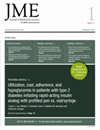Narrative review of value frameworks in urothelial carcinoma and positioning of enfortumab vedotin.
IF 2.9
4区 医学
Q2 HEALTH CARE SCIENCES & SERVICES
引用次数: 0
Abstract
AIMS Evaluate existing oncology value frameworks in terms of their methodology, structure, characteristics, and functionality using the example of enfortumab vedotin, an approved therapy for urothelial carcinoma. METHODS A search of PubMed, grey literature, and official websites of relevant international organizations was performed from January 2022 to March 2023. RESULTS Six frameworks were identified and analyzed, including the American Society of Clinical Oncology's assessment framework, European Society for Medical Oncology's Magnitude of Clinical Benefit Scale, the National Comprehensive Cancer Network's Evidence Blocks, Memorial Sloan Kettering Cancer Center's DrugAbacus, Institute for Clinical and Economic Review's assessment framework, and the Drug Assessment Framework. Comparisons across frameworks were challenging, owing to differing approaches, objectives, perspectives, methodology, and criteria. Based on the results of the EV-301 study (NCT03474107), the European Society for Medical Oncology's Magnitude of Clinical Benefit Scale assigned a score of 4 out of 5 to enfortumab vedotin administered after chemotherapy and immunotherapy. The National Comprehensive Cancer Network's Evidence Blocks enabled assessment of enfortumab vedotin compared with other treatments for locally advanced or metastatic urothelial carcinoma, resulting in the positioning of enfortumab vedotin as a preferred regimen after chemotherapy and immunotherapy. CONCLUSIONS Application of value frameworks in oncology can contribute to informed value-based decision-making. However, comparisons across frameworks should be made with caution and limited to the same lines of treatment. Enfortumab vedotin may contribute to optimizing outcomes in patients previously treated with chemotherapy and immunotherapy for locally advanced or metastatic urothelial carcinoma.对尿路上皮癌价值框架和恩福单抗维多汀定位的叙述性回顾。
目的以恩福单抗维多汀(一种已获批准的尿路上皮癌治疗方法)为例,从方法、结构、特点和功能等方面对现有的肿瘤学价值框架进行评估。方法在 2022 年 1 月至 2023 年 3 月期间对 PubMed、灰色文献和相关国际组织的官方网站进行了检索。结果确定并分析了六个框架,包括美国临床肿瘤学会的评估框架、欧洲肿瘤内科学会的临床获益量表、美国国家综合癌症网络的证据块、纪念斯隆-凯特琳癌症中心的药物算盘、临床与经济审查研究所的评估框架以及药物评估框架。由于方法、目标、视角、方法和标准不同,对不同框架进行比较具有挑战性。根据 EV-301 研究(NCT03474107)的结果,欧洲肿瘤内科学会的临床获益程度量表为在化疗和免疫疗法后使用恩福单抗维多汀打出了 4 分(满分 5 分)。美国国家综合癌症网络的证据模块对恩福单抗维多汀与其他治疗局部晚期或转移性尿路上皮癌的方法进行了比较评估,最终将恩福单抗维多汀定位为化疗和免疫治疗后的首选方案。结论在肿瘤学中应用价值框架有助于做出基于价值的知情决策。然而,在不同框架间进行比较时应谨慎,且应仅限于相同的治疗方案。对于既往接受过化疗和免疫疗法治疗的局部晚期或转移性尿路上皮癌患者,恩福单抗维多汀可能有助于优化其预后。
本文章由计算机程序翻译,如有差异,请以英文原文为准。
求助全文
约1分钟内获得全文
求助全文
来源期刊

Journal of Medical Economics
HEALTH CARE SCIENCES & SERVICES-MEDICINE, GENERAL & INTERNAL
CiteScore
4.50
自引率
4.20%
发文量
122
期刊介绍:
Journal of Medical Economics'' mission is to provide ethical, unbiased and rapid publication of quality content that is validated by rigorous peer review. The aim of Journal of Medical Economics is to serve the information needs of the pharmacoeconomics and healthcare research community, to help translate research advances into patient care and be a leader in transparency/disclosure by facilitating a collaborative and honest approach to publication.
Journal of Medical Economics publishes high-quality economic assessments of novel therapeutic and device interventions for an international audience
 求助内容:
求助内容: 应助结果提醒方式:
应助结果提醒方式:


